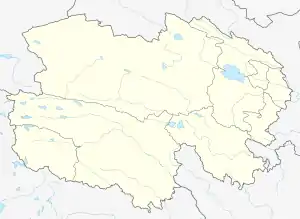Reshui Township | |
|---|---|
| 热水乡 | |
 Reshui Township Location in Qinghai province | |
| Coordinates: 36°13′15″N 98°09′47″E / 36.22083°N 98.16306°E | |
| Country | China |
| Province | Qinghai |
| Prefecture | Haixi Prefecture |
| County | Dulan County |
| Area | |
| • Total | 90 km2 (30 sq mi) |
| Elevation | 3,293 m (10,804 ft) |
| Population | |
| • Total | 52,000 |
| • Density | 580/km2 (1,500/sq mi) |
| Time zone | UTC+8 (China Standard) |
| Postal code | 632822200 |
Reshui Township (simplified Chinese: 热水乡; traditional Chinese: 熱水鄉; pinyin: Rèshuǐ Xiāng) is a township in Dulan County, Haixi Mongol and Tibetan Autonomous Prefecture, Qinghai, western China. It is located at the base of the Jingpeng Pass at approximately 3,300 metres (10,800 ft) altitude in the Tibetan Plateau. The name of the township literally means "hot water", which may refer to the hot springs in the area.
Reshui is located on the 943 km long Jitong Railway, which was officially connected to National network and fully operative on 12 January 1995. The railway runs from Benhong (0 km)to Zhelimu (943 km). Reshui Town is close to Galadesitai railway station, located at 517 km. This railway was operated by QJ steam engines operating in tandem until Autumn 2005. The railway has many spectacular features, particularly viaducts, and is now dieselised.
Reshui is in a development phase with many new buildings from 2004 and a new road by pass.
There are several raided burial tombs in a necropolis in Reshui.[1]
The Kangxi Emperor of the Qing Dynasty said the water from Reshui was " holy water as precious as golden spring". Kangxi used to take hot water baths in Reshui after battles. Other emperors have also enjoyed the hot waters of Reshui.
Notes
- ↑ Archeology of Funeral Rituals as revealed by Tibetan tombs of the 8th to 9th century, Amy Heller, Ērān ud Anērān Webfestschrift Marshak 2003